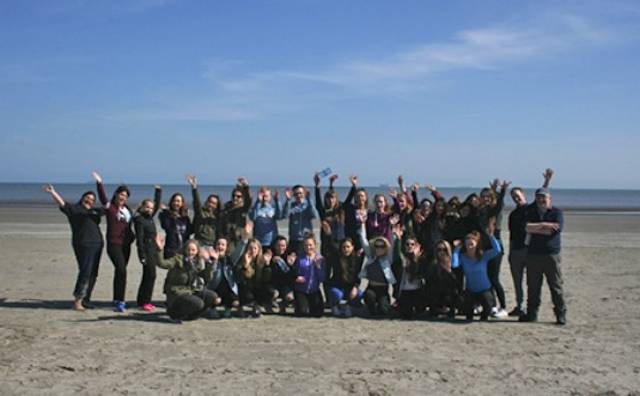#MarineScience - Dublin City University's St Patrick's Campus and the Marine Institute ran a pilot marine module with over 40 student teachers this week, giving them an opportunity to learn about teaching marine science and Ireland’s marine heritage.
Marine Institute chief executive Dr Peter Heffernan welcomed the collaboration with DCU to introduce themes relating to the marine environment into the science module.
“We recognise the unique position teachers have to help students develop an understanding of our amazing ocean resources," he said. "We hope these teachers will inspire curiosity among their students to learn more about the ocean and to develop an understanding of how we influence the ocean and how the ocean influences us.”
With a focus on a 'Marine Day' on 20 April on campus and in and the wider university, the oceans, seas and shorelines around Ireland present many opportunities to introduce marine themes into a range of cross curricular lessons,” explained Dr Thomas McCloughlin lecturer and lab manager of science at DCU's St Patricks Campus.
The Marine Institute provided a saltwater aquarium as well as a tidal tank for the modules, showing how bringing the seashore to the class provides an exciting way to learn about marine animals typically found on the seashore.
The programme was delivered to over 40 second- and third-year student teachers and included a field trip to the seashore and a range of interactive presentations in class.
“Student teachers get to explore the seashore through field trips as well as analysing specimens through examination and dissection in class. This allows them to integrate examining the biological themes of the marine as well as introducing social, physical-human and geographical influences relating to understanding and ocean resource,” said Dr Noirin Burke of the Galway Atlantaquaria, representing the Marine Institute’s primary school Explorers Education Programme.
Ireland has a seabed territory of approximately 880,000 sq km, 10 times greater than the size of the island of Ireland, making this one of the largest maritime member states of the European Union.
“Therefore, with Ireland being responsible for such a significant ocean resource, it is considered fundamental to teach Irish children, particularly as we are an Island nation, the historical and cultural values as well as the geographical and scientific backgrounds of our marine environment,” said Cushla Dromgool-Regan, responsible for the strategic development of education at the Marine Institute.
The pilot is supported by the Marine Institute and the Explorers Education Programme, which aims to build on Ireland’s marine and maritime heritage by increasing awareness of the value, opportunities and social benefits of our ocean wealth and identity.
The pilot was supported by Explorer Education Centres, Galway Atlantaquaria, Blackrock Education Centre and Sea Life Bray. For more information about the Explorers Education Programme see www.explorers.ie.

































































